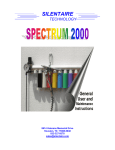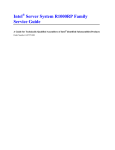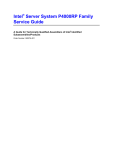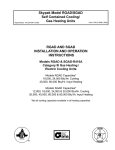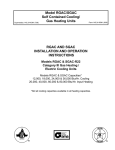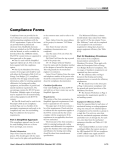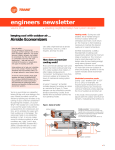Download Sharp R-240B Specifications
Transcript
MODELS DSH/DSV R-410A AIR SIDE ECONOMIZER KIT Form 145.11-IOM1 (412) AIR SIDE ECONOMIZER FOR DSH AND DSV R-410A AIR COOLED AIR CONDITIONING UNITS INSTALLATION INSTRUCTIONS B Style IMPORTANT! READ BEFORE PROCEEDING! GENERAL SAFETY GUIDLINES This equipment is a relatively complicated apparatus. During installation, operation, maintenance or service, individuals may be exposed to certain components or conditions including, but not limited to: refrigerants, oils, materials under pressure, rotating components, and both high and low voltage. Each of these items has the potential, if misused or handled improperly, to cause bodily injury or death. It is the obligation and responsibilty of operating/service personnel to identify and recognize these inherent hazards, protect themselves, and proceed safely in completing their tasks. Failure to comply with any of these requirements could result in serious damage to the equipment and the property in which it is situated, as well as sever personal injury or death to themselves and people at the site. This document is intended for use by owner-authorized operating/service personnel. It is expected that this individual possesses independent training that will enable them to perform their assigned tasks properly and safely. It is essential that, prior to performing any task on this equipment, this individual shall have read and understood this document and any referenced materials. This individual shall also be familiar with and comply with all applicable governmental standards and regulations pertaining to the task in question. SAFETY SYMBOLS The following symbols are used in this document to alert the reader to areas of potential hazard. DANGER indicates an imminently hazardous situation which, if not avoided, will result in death or serious injury. WARNING indicates a potentially hazardous situation which, if not avoided, could result in death or serious injury. CAUTION identifies a hazard which could lead to damage to the machine, damage to other equipment and/or environmental pollution. Usually and instruction will be given, together with a brief explanation. NOTE is used to highlight additional information which may be helpful to you. All wiring must be in accordance with published specifications and must be performed ONLY by qualified service personnel. Johnson Controls will not be responsible for damages/problems resulting from improper connections to the controls or application of improper control signals. Failure to follow this will void the manufacturer’s warranty and cause serious damage to property or injury to persons. CHANGEABILITY OF THIS DOCUMENT In complying with Johnson Controls policy for continuous product improvement, the information contained in this document is subject to change without notice. While Johnson Controls makes no commitment to up-date or provide current information automatically to the manual owner, that information, if applicable, can be obtained by contacting the nearest Johnson Controls service office. It is the responsibility of operating/service personnel as to the applicability of these documents to the equipment in question. If there is any question in the mind of operating/service personnel as to the applicability of these documents, then, prior to working on the equipment, they should verify with the owner whether the equipment has been modified and if current literature is available. TABLE OF CONTENTS 4 …… Installation 5 ……Mixing Box Dimensions & Component Layout 6 …….Interconnection Harness 7 ……Damper & Actuator Set-up 10 …. Wiring Schematics 12 …. Sequence of Operation PRIOR TO INSTALLING OR SERVICING THE UNIT, LOCK ALL ELECTRICAL POWER SUPPLY SWITCHES IN THE OFF POSTION. FAILURE TO DISCONNECT POWER SUPPLY MAY RESULT IN ELECTRICAL SHOCK OR EVEN DEATH. 3 1. INSTALLATION Horizontal/Vertical Economizers 1. Attach mixing box to unit evaporator return, using the metal securing strip provided. Fasteners may also be used around the perimeter of the mixing box, at the location of the filter frame, for additional security. This is intended to connect the units, and not to support the full weight of the economizer mixing box – ADDITIONAL FIELD SUPPORT IS REQUIRED. This may be from the ceiling, or from beneath the unit. 2. Determine which inlet will be outside air, and which will be return air. If the normal open/closed position of the dampers needs to be reversed, remove the actuator, reset the damper positions so that the outside air damper is closed and the return air damper is fully open. Adjust the linkage rod to these normal positions, and secure. Reattach the actuator so that it is rotating in the appropriate direction. 3. The module is connected to the unit wiring via a 2-part wiring harness. Minimal field rewiring of the unit is required in order to accommodate the Air-Side Economizer option. Refer to Section 6 for detailed instructions. Connect the wiring harness to the microprocessor board as indicated in Section 4 – Wiring Harness Installation. 4. With the power to the module, the actuator springs will wind and lock. The enthalpy changeover setting may be altered, and the outside air damper minimum position adjusted. See the attached Honeywell information for details. Prior to installing or servicing the unit, lock all electrical power supply switches in the OFF position. Failure to disconnect power supply may result in electrical shock or even death. Additional field support of the mixing box is required. Failure to provide adequate support for the unit may result in injury or even death. Exercise care when working around the sharp metal edges of door panels or flanges. These edges are sharp and can cause injury. 2. VERTICAL MIXING BOX DIMENSIONS Vertical Unit Model Number Economizer Model Number DSV060B VASE-060B-1 DSV096B/120B VASE-120B-1 DSV144B/180B DSV240B VASE-180B-1 VASE-240B-1 MIXING BOX DIM'N DAMPER DIM'N CONTROL MODULE A B C D E F G 49.00 66.50 78.00 86.00 27.75 36.25 35.75 41.25 24.00 26.50 28.50 34.00 40.00 58.00 70.00 78.00 14.00 19.50 19.50 25.00 8.00 15.00 8.00 15.00 8.00 8.00 15.00 15.00 4 3. HORIZONTAL MIXING BOX DIMENSIONS STANDARD SIDE & FRONT DAMPER ARRANGEMENT OPTIONAL BOTTOM & FRONT DAMPER ARRANGEMENT Horizontal Unit Model Number Economizer Model Number DSH024B/036B HASE-036B-SF DSH048B/060B HASE-060B-SF DSH096B HASE-100B-SF Horizontal Unit Model Number Economizer Model Number DSH024B/036B HASE-036B-BF DSH048B/060B HASE-060B-BF DSH096B HASE-100B-BF MIXING BOX DIM'N DAMPER DIM'N CONTROL MODULE A B C D E F G 26.06 29.68 33.63 23.32 23.44 25.25 23.44 30.44 33.63 17.00 24.00 28.00 14.00 14.00 19.50 8.00 15.00 8.00 15.00 8.00 15.00 MIXING BOX DIM'N DAMPER DIM'N CONTROL MODULE A B C D E F G 26.06 29.68 33.63 23.32 23.44 25.25 23.44 30.44 33.63 17.00 24.00 28.00 14.00 14.00 19.50 8.00 15.00 8.00 15.00 8.00 15.00 5 of the harness will enter through the knockout hole in this area. Ensure the harness is secured on the outside of the unit using the cable clips provided. 4. WIRING HARNESS INSTALLATION AIRSIDE ECONOMIZER TO UNIT CONNECTION Each Air-Side Economizer is shipped complete with a two-part wiring harness. The terminated end of the wiring harness that is shipped in a package with the economizer must be field wired into microprocessor board. The second part of the harness assembly is pre-wired into the Economizer module panel. The two parts of the harness are connected together by integrated polarized molex plugs. Installing Harness (Horizontal Units): 1) Working from the evaporator blower access door, feed the loose pre-terminated ends of the harness along the base of the unit towards the right end and back out, using the low voltage electrical conduit, to the condenser section and into the condenser electrical panel. For split unit applications the harness will need to be extended in the field using 18 gauge wire. Ensure the cable is protected from damage and the wiring meets all local code requirements. All Models 6 Pin Molex Plug Pin # Color Connection ID 1 Yellow/Red Y-OUT 2 Yellow/Red ECON 3 Gray/Red G-OUT 4 Pink OCCUPIED 5 White COMMON 2) Inside the condenser electrical box, connect the harness terminations to the microprocessor board economizer harness terminations (Y-Out, G-Out, ECON, and OCCUPIED), as shown in the electrical schematic. Note that the Occupied terminal is not being used in the standard factory setup and has been provided if required in the field. Installing Harness (Vertical Units): 3) Connect the WHITE COMMON wire from the harness onto the Common tab on the microprocessor board, using the provided tab adapter, as shown in the electrical schematic. 1) Working from the side access door, feed the loose pre-terminated ends of the harness in through the back of the low voltage section of the electrical box, through the bushed hole. 4) Inside the blower section of the evaporator unit secure the harness along base towards the left corner post using the supplied cable clips. Ensure that the harness is routed clear of moving parts and sharp edges, and that there are no loose wires that can be pulled into the blower inlet. Coil excess wire length, and secure with cable clips (see photo). 2) Connect the harness terminations to the microprocessor board economizer harness terminations (Y-Out, G-Out, ECON, and OCCUPIED), as shown in the electrical schematic. 3) Connect the WHITE COMMON wire from the harness onto the Common tab on the microprocessor board, using the provided tab adapter, as shown in the electrical schematic. 5) The plug end of the harness should terminate inside the bottom left corner post. The economizer half of the harness will enter through the knockout hole in this area. Use a punch out tool or screwdriver. Feed the plug end harness through and connect to the other half of the economizer harness. Ensure the harness is secured on the outside of the unit using the cable clips provided. 4) Inside the condenser section secure the harness to the side of the blower housing using the supplied cable clips. Ensure that the harness is routed clear of moving parts and sharp edges, and that there are no loose wires that can be pulled into the blower inlet. Coil excess wire length, and secure with cable clips (see photo). 5) The plug end of the harness should terminate inside the rear corner post. The economizer half 6 ECONOMIZER – DAMPER & ACTUATOR SETUP (VERTICAL SETUP) Installed Harness VERTICAL ECONOMIZER HORIZONTAL ECONOMIZER SINGLE STAGE ECONOMIZER WIRING SCHEMATICS DUAL STAGE ECONOMIZER WIRING SCHEMATICS 6. SEQUENCE OF OPERATION Modulating Economizer with Typical Electro Mechanical Thermostat The Honeywell W7215 module, ML series actuators, JCI damper sections, and factory wiring harness comprise an integrated economizer. These economizers are used to provide ventilation and free cooling for the JCI Series of vertical, and horizontal, air handlers. The Honeywell W7215 can accept inputs from additional optional sensors, including a return-air enthalpy sensor (for differential enthalpy control) or a CO2 sensor (for Indoor Air quality strategies). The economizer module also provides a provision for remote damper position control. Min. and max. damper position settings can be remotely controlled using the P and P1, and Q and Q1 terminals on the economizer module. For more information regarding these features, consult the Honeywell W7215 manual included with the Economizer kit. Powering the Thermostat (24vac) Power to the electromechanical thermostat is provided from R terminal of the JCI unit’s low voltage terminal strip. Electromechanical thermostats do not require a 24vac common connection. Powering the W7215 (24vac) The W7215 is powered from the JCI unit’s microprocessor board at the G-Out pin whenever the fan of the evaporator section is operating. To ensure that the W7215 is continuously powered, the fan switch on the thermostat sub-base should be left on at all times. High Enthalpy Sequence: When the outside air enthalpy exceeds the enthalpy set-point, the economizer W7215 module terminals 1 and 2 are closed and economizer will be forced into the minimum damper position setting. The JCI unit’s microprocessor board will control cooling requirements. Low Enthalpy Sequence: When the outside air enthalpy is below the enthalpy set-point, W7215 economizer terminals 1 and 2 are opened and free cooling is activated. The JCI unit’s microprocessor board turns off compressor operation. Damper Modulation: On all JCI units' the C7046 temperature sensor should be located in the discharge air duct. Locating the sensor in the discharge air provides effective 'low-limit' sensing and control. The outside-air damper remains at minimum position if the 0 0 discharge air temperature is below 50 F or 10 C. If 0 0 the discharge air temperature is between 50 to 56 0 0 F (10 to 13.3 C) the outside air damper will modulate between minimum position and fully open. 0 0 Above 56 F (13.3 C) the outside air damper will remain in the fully open position. Occupied: The OCCUPIED harness terminal is not connected to the economizer controller. It has been provided if site conditions require field connection of an Occupied function. Consult the Honeywell W7215 Economizer Controller Manual for more information. Subject to change without notice. Printed in U.S.A. Copyright© 2012 by Unitary Products Group. All rights reserved. Engineered Systems Products Group Form 145.11-IOM1 (412) P.O. Box 1592 York, PA 17405 York PA 17405

















